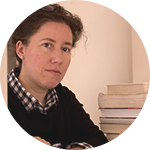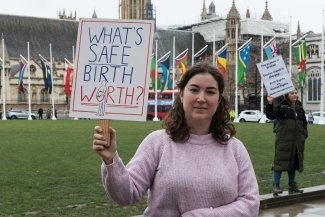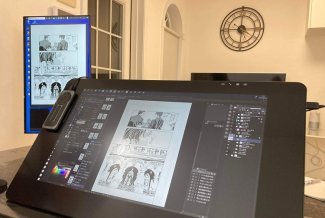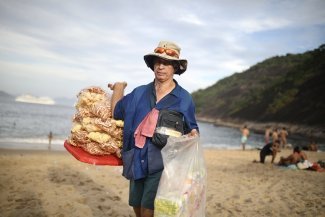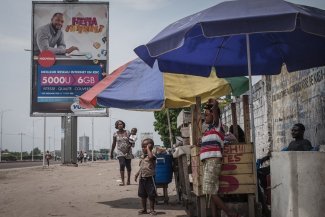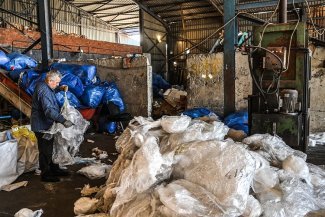Bertha Zúñiga Cáceres, in April 2017, in Brussels, where she met with representatives dealing with business and human rights from European institutions (Commission and Council, buildings in the background), and representatives of the Belgian Foreign Ministry.
Bertha Zúñiga Cáceres, the new general coordinator of the Civic Council of Popular and Indigenous Organisations of Honduras (COPINH), a position held by her mother, Berta Cáceres, until she was murdered on 3 March 2016, tells Equal Times that the indigenous people of this Central American country have development proposals for foreign investment funds that are prepared to listen to them. As well as being viable, they are proposals that respect the environment and human rights.
The activist carries the struggle to defend the environment and the underprivileged in her genes (her mother was awarded the Goldman Environmental Prize and her grandmother, Austra Berta Flores, was the mayor of La Esperanza, governor of Intibucá and deputy in the National Congress, to mention just two from a long line of examples). She is currently campaigning against projects backed by the Central American Bank for Economic Integration (CABEI), under which blatant human rights violations are being perpetrated with impunity.
Honduras is the deadliest country in the world for environmental defenders, according to a report by Global Witness. As many as 101 environmentalists were assassinated between 2010 and 2014. Many others suffered threats and intimidation, which have virtually become part of everyday life for activists.
“The climate of defencelessness affects everyone,” she insists, going on to explain how the attacks against her personally have escalated in recent times. In addition to the ongoing stigmatisation, harassment and repression, on 30 June of this year, she was the victim of an armed attack and an attempt on her life, despite the fact that observers from around the world are keeping a close eye on the situation.
Zúñiga Cáceres is keeping up the fight to ensure those who perpetrated and ordered her mother’s assassination are identified and brought to justice, in a country where impunity is the norm.
What stage has been reached in the investigation into the murder of Berta Cáceres? Do you think it could set a legal precedent for other lower profile cases in Honduras – given that your mother is an emblematic figure and the international community is following the case very closely?
That is the idea, to set a legal precedent in a country where there is no justice. The problem is that this doesn’t seem feasible in Honduras, not so far at least. You have to remember that Honduras has an impunity rate of 96 per cent, which is what makes killing people so easy.
The idea is to strengthen the legal and judicial institutions in the country, so that they become an example, but the truth is that there is no political will and when there is no political will, it’s difficult to imagine that this can be achieved. Internally, we are pressing ahead with litigation, as private parties, with the support of many people in Honduras and beyond. We know that there is a great deal of international observation... But we feel disappointed. And worried, because no sentence has been pronounced [against the eight people remanded, to date], and this could be dragged on for a year, two years… until the international pressure dies down – which is the only concern of the institutions in Honduras – and then there will be no investigation into who was behind the crime.
Following the murder of Cáceres, Leónidas Rosa Bautista, the Honduran ambassador to the OAS, announced a battery of measures to tackle the human rights abuses, such as the creation of a human rights observatory and a commission with human rights defenders to promote protection measures, etc. How do you view this response?
The mechanism to protect human rights defenders was a response to the pressure from the international community and the conditions placed on funding in areas such as a military aid, etc. But in reality, it’s just an exercise to clean up the Honduran government’s image, because nothing has actually changed since the murder. We continue to be as defenceless as ever. Moreover, in the case of the COPINH in particular, the national campaigns on the radio and TV criminalising and stigmatising us have grown fiercer, and the government of Honduras is doing absolutely nothing.
Honduras has a lot of laws, you could almost say it has more than it needs, but the problem is that they are not respected. The protection mechanism and such initiatives designed to ensure respect for the communities’ rights and to protect lives are a good thing, but the problem is that there is no trust, because information is leaked and there is corruption. People are afraid of giving their data a to mechanism when we know it could end up in the hands of the state security service, which is involved in a lot of the intelligence work and the persecution of the kind suffered by my mother.
Honduras has the world’s highest murder rate for environmental defenders, per capita, according to the Global Witness report. It is rich in the natural resources exploited in a variety of industries, but it is not the only country of Latin America, or the world, with this profile. What makes Honduras so deadly?
Honduras is a relatively small country for Latin America, with more than 30 per cent of its territory held in the form of concessions by extractive industry firms and clean and dirty energy producers of all kinds. The state exists to protect the interests of private business, the governments and public officials; not to safeguard the basic rights of indigenous communities.
What is clearly reflected in the Global Witness report is the collusion between the government, private business, the military and foreign money. Honduras is a country that depends almost entirely on outside financial support – which is also why the messages from Europe weigh so heavily on it.
Since the coup d’état in Honduras [ousting Manuel Zelaya in 2009], let’s say, we have been experiencing the same phenomenon as in other Latin American countries, only that here it has been much more fast-moving and aggressive. The mutation of states linked to organised crime and corruption facilitates the climate of impunity, under which people defending the land are killed.
We know that what is in dispute in the world today are the natural commons, because that is where the energy is going to be taken from, it’s the new business. As a result, those of us who are working to defend ancestral lands – most often indigenous peoples – are faced with a very complicated situation. At the same time as talking about defending human rights, they are promoting energy production and giving incentives to companies linked to the oligarchs in our country. The result is a huge climate of permissiveness, allowing crimes to be committed so that the extractive and energy industry companies can move in, whatever the cost.
Governments all around the world are constantly competing to attract foreign investment to their respective countries. They have to find solutions to growing populations, growing energy demands... What is the main problem you see with the type of investment currently flowing into Honduras and do you offer local alternatives, to be able to manage without it?
Of course indigenous communities in Latin America present proposals that respect life and do not rely on the deadly private business in our countries.
We would never promote private business. Our interest lies in covering our basic needs, and there are many proposals in this sense. I always remind people that my mother was murdered in the midst of an alternative energy workshop at which the Lenca community had gathered to discuss an energy model – developed by the indigenous communities themselves – that would not be linked to private business or investments with no interest in providing energy to the poor.
There is no interest in promoting small projects; it’s a lie. Honduras has a number of national hydropower plants that are operating at 20% of their capacity, and this could be increased, but they limit it, so that they can say, “we need more energy, we need more hydroelectric power plants”.
Honduras is part of a Mesoamerican electric transmission corridor, which is intended to generate energy for big industry, mining, mega-tourism projects and the energy demands of developed countries, which are the ones that need it.
We always say that there could be more North-South exchange initiatives, proposals that respect our rights, that are not underpinned by racist policies – but they continue to view us as stupid, ignorant people that they need to civilise.
There are many interesting proposals being made by indigenous populations to tackle these rights issues, the problem is that they are not allowed to flourish, there are no incentives for that kind of project. That’s not where the so-called development funds are going to be channelled.
For us, part of our work is to clarify the situation, to break with the hypocrisy of making it look like they’re trying to help the least advantaged communities, because it is simply not true. They turn people into administrators of their poverty, and that is not what we are proposing or fighting for, not the COPINH nor other organisations. Our proposal is to take control of our goods, ensuring respect for our ways of interpreting the world and our spiritual beliefs, whatever is necessary.
Do the projects funded by the CABEI respect your interests?
The Central American Bank for Economic Integration is part of the structures of the World Bank. They promote projects that move in, whatever the cost, be it violence or murder, and benefit the oligarchs.
Agua Zarca, [for example] is owned by the Atala family, the most powerful family in Central America. They lobby for the “renewable energy” producers in Honduras, part of the Honduran oligarchy that is reaping the financial benefits of all this. And they speak against organisations that defend the land, because we are affecting their economic earnings. They will not allow it. That is why they murdered Berta Cáceres, for being a hindrance. They don’t want any hindrances for private business in Honduras. They made quite strong statements against her and the COPINH.
In a blog for Equal Times, researcher Karen Hudlet recently suggested a number of measures that companies could take to ensure that they do not act as accomplices to human rights violations, such as human rights impact assessments and regard for the context/environment in which they plan to operate. How feasible do you think this is?
They are interesting ideas, the problem is that in Honduras there is no rule of law.
For us, the problem is that many of the funders are aware that these things are happening in Honduras. In the case of Agua Zarca, my mother communicated directly, on various occasions, with the funders and with the CABEI, to tell them that the project was violating rights, that they could not enter into a contract with companies. They didn’t respond. She wrote again, providing information on the corruption, the hired gunmen – Tomás García had already been murdered [in 2013]. They replied: “Who are you to represent the Lenca indigenous people? You don’t represent them. We have no reason to talk to you.”
There is a racist policy [behind it], so studies can be done, but it doesn’t mean they’re going to pull out their investment. If the investors start doing studies on the guarantees for life and basic rights, they will start to realise what the situation is, and to see that investing is not feasible.



